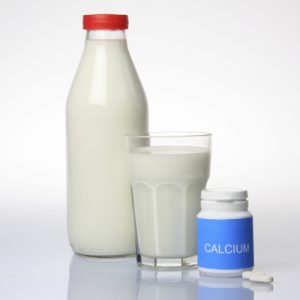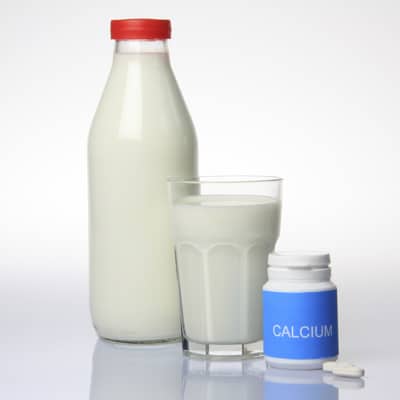 At whatever age, we should all be concerned about our bones– maintaining good bone health is a lifelong process. Recent reports state that calcium supplementation may be ineffective for the prevention of bone fractures in elderly, but is this true? More on that later.
At whatever age, we should all be concerned about our bones– maintaining good bone health is a lifelong process. Recent reports state that calcium supplementation may be ineffective for the prevention of bone fractures in elderly, but is this true? More on that later.
There are a few things that are not always recognised about bone:
- It is a living tissue that is constantly changing throughout life.
- The total amount of bone we have increases until we reach our peak bone mass in early adulthood, but by our mid 30s the proportion of bone we lose exceeds new bone produced, and this imbalance increases as we age. Bone loss is particularly significant in women post menopause as oestrogen that protects bones, decreases sharply.
- Lifestyle factors, such as nutrition and exercise, as well as our genetic make-up will affect the amount of bone laid down in our early years and the pattern of bone loss in later life.
So let’s talk more about nutrition – another not often commonly recognised nutrition fact about bone is that it more than just calcium that impacts on bone health. Vitamin D is vital as it is needed for our bodies to be able to absorb calcium. Other important bone nutrients include adequate protein, magnesium and phosphorus. On top of this excess alcohol, smoking and low physical activity can adversely impact on bone health.
But if calcium is important why are there headlines in the press this week such as Calcium not as great for bones as once thought and Calcium supplements don’t work, say experts?
These headlines are based on two reviews published in the BMJ by a team of researchers from New Zealand that looked at the effects of calcium intake on bone density and risk of fracture in adults over age 50. We will focus here only on the results of the reviewed randomised controlled trials, as these provide the most robust evidence.
In the first report, the researchers analysed the results of 59 randomised controlled trials involving more than 12,000 people. They found that increasing calcium intake — either through diet or by taking supplements — increased subjects’ bone-mineral density by up to 2%. However, the researchers concluded that this increase may be clinically insignificant in respect of reducing risk of fracture.
In the second analysis, the researchers looked at looked at 26 randomised controlled trials of calcium supplements, which covered around 69 000 people, and reported an 11% reduction of the risk of fractures (RR 0.89, 95% CI 0.81 to 0.96).The authors concluded that there was some evidence that calcium reduced the risk of total fractures, but the results were weak and inconsistent.
What about calcium supplementation in the care home population?
Looking specifically at the care home population, the review does mention in particular a trial undertaken in frail nursing home residents with both low vitamin D status and habitually low calcium intake who were treated with vitamin D (800 IU per day) and calcium (1200, mg per day). The authors suggest the high reduction in fracture incidence reported in this particular study indicate supplementation may only be effective when targeted to individuals with documented, or at high risk of, deficiencies and those with a high fracture risk.
Adequate calcium from the diet is important
With regards to dietary calcium, there is nothing in these studies to suggest that adopting a healthy, balanced diet with calcium-rich foods in not beneficial; an adequate intake of both vitamin D and calcium is important. There are already guidelines in place for recommendation of vitamin D supplements in all those aged 65 years and over. But natural sources of vitamin D are few, whereas there are many sources in the UK diet for calcium. National dietary surveys show the main source of calcium is milk and milk products contributing over 40% of total dietary calcium intake in those aged 65 years and over. Non-dairy sources of calcium include fortified non-dairy alternatives like soy drinks and yogurts, white bread (as white flour is fortified with calcium), some dark green vegetables like kale and watercress, some nuts like almonds and canned fish with soft bones like sardines.
The two BMJ meta-analyses do, suggest positive but weak and inconsistent results for calcium supplements and bone health. The authors’ conclusion is that for most people supplements “probably have an unfavourable risk benefit profile.” This conclusion rests on the argument that risks associated with supplementation must be balanced with the small inconsistent benefit seen in their analysis. Calcium supplementation studies have reported gastrointestinal side effects in some people, and there have also been recent reports of an association between calcium supplements and adverse cardiovascular events.
For most healthy people, the reviews suggest that calcium supplements may make a minimal difference to bone health and risk of fracture. Most people should get enough calcium (recommended intake for adults in the UK is 700mg/day) through a normal diet. On average UK adults over 65 living in the community have an intake of 825mg/d from food only, and when supplements are included an average of 900 mg/d, although we must be aware that averages will mask vulnerable sub groups and we do not have current calcium intakes for care home populations.
Super bones?
If we think logically, in the general population if we are consuming adequate amounts of calcium taking large supplemental doses on top of this is not likely to be effective – there is no logic in thinking that we can develop super–bones where they can use more and more calcium to become stronger and stronger. In addition there are other dietary and lifestyle factors that contribute to bone health, and we must not forget the important message that all people aged 65 and over should be taking a vitamin D supplement
Will these headlines make people think calcium is less important for bones rather than the actual message that calcium supplementation on top of an adequate dietary supply may not be effective? A further concern is that on reading such headlines, people may stop taking supplements, or their relatives may advise them to do so. It’s important to remember that the majority of studies were looking at generally healthy older people, not people who had a medical reason for taking calcium supplements. If calcium and vitamin D supplements have been advised because of osteoporosis, or because of deficiencies in these nutrients, people should continue to take them, and any concerns discussed with a health professional that can advise the person with regards to a decision to continue or stop.





